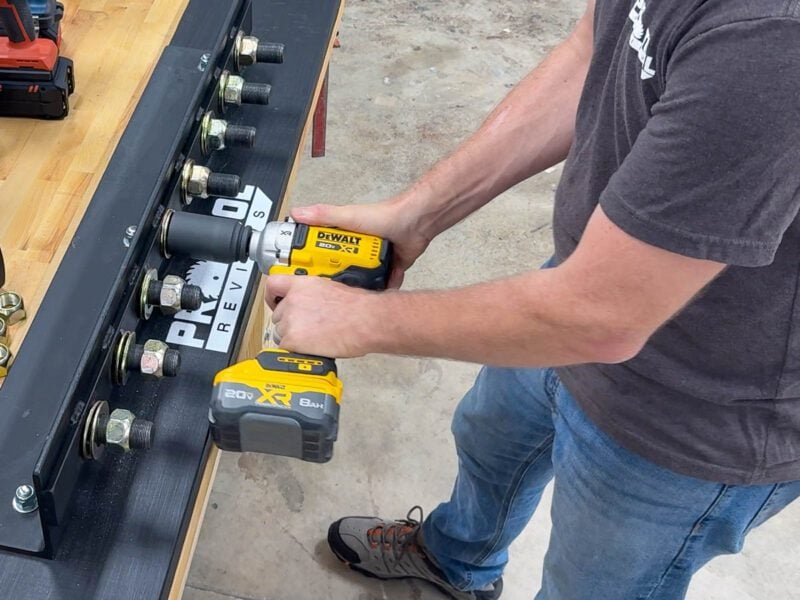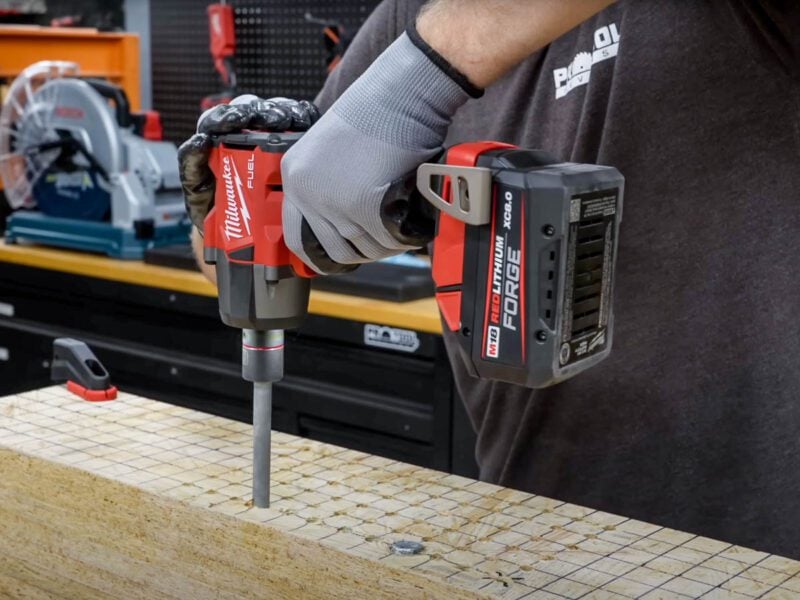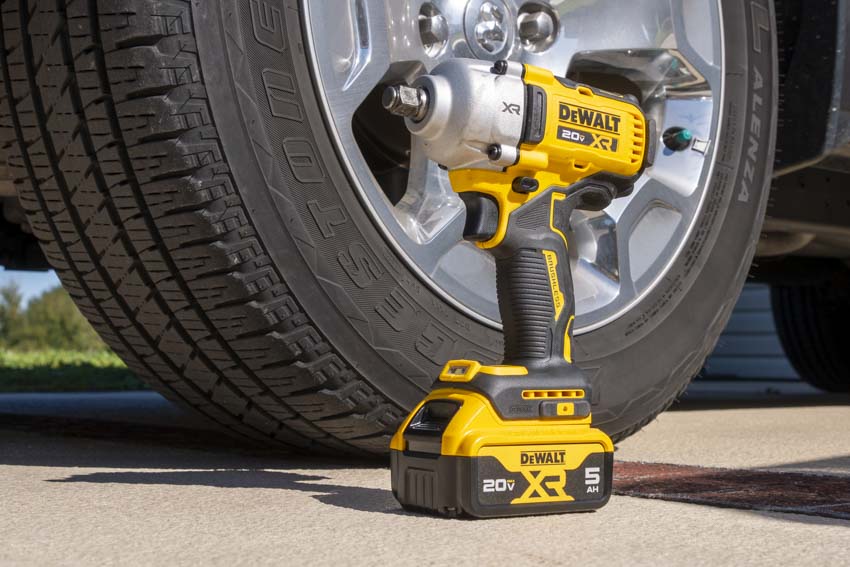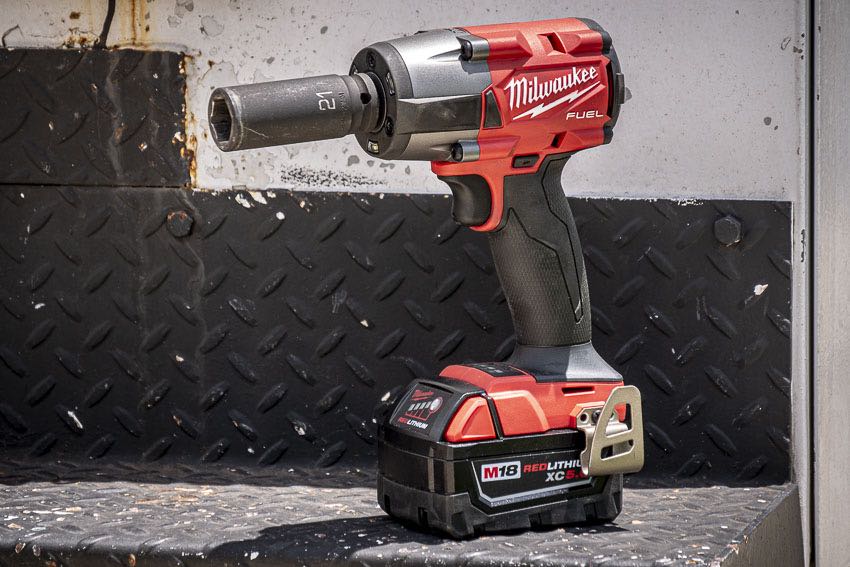We just wrapped up testing ten of the most popular mid-torque impact wrenches from brands you know and trust. Now, we’re highlighting two key contenders: the DeWalt DCF891 and the Milwaukee 2962. Both models are packed with Pro-level features and are built to handle the rigors of the jobsite. But which one truly comes out on top in a head-to-head challenge? Let’s break it down and find out.
See the full results of our Best Cordless Impact Wrench head-to-head testing!
Milwaukee Vs DeWalt Impact Wrench Specifications
Here’s a quick look at the key specs to know before we jump into testing:
| DeWalt DCF891 | Milwaukee 2962 | |
|---|---|---|
| No-Load Speed | 2,000 RPM | 2,575 RPM |
| Max Impact Rate | 3,250 IPM | 3,100 IPM |
| Max Breakaway Torque | 800 ft-lbs | 650 ft-lbs |
| Max Fastening Torque | 600 ft-lbs | 550 ft-lbs |
| Head Length | 6.88 in. | 5.88 in. |
| Bare Weight | 3.83 lbs | 3.55 lbs |
| Working Weight | 5.95 lbs (with 8.0Ah PowerPack battery) | 5.95 lbs (with 8.0Ah Forge battery) |
Milwaukee Vs DeWalt Impact Wrench: How We Tested
Bolt Break Test

This test is all about breakaway torque. We start by tightening eight 1 1/2-inch lug nuts down to 500 ft-lbs using a specialized torque wrench and time how long it takes each tool to loosen all eight nuts. This gives us a solid, real-world representation of each tool’s capabilities.
Lag Bolt Test

In order to test the fastening torque, we drive a 10 x 1/2-inch lag bolt into a laminated OSB test block. Each tool has 30 seconds to sink the lag bolts. If the bolt is not completely sunk, we measure the inches remaining as our data results. This is a tough ask for most mid-torque impact wrenches, but it’s a good test that displays the raw driving power of these tools.
Inertia Torque Test
The last test we ran measures torque using an L1000 torque tester from Inertia Torque. This is very different from our other tests because it only tests torque without speed or impact rate coming into play.
Our method is to run three 5-second intervals with a 3-second break between and take the highest torque reading. This helps us understand how much actual torque the impact wrench is producing, and it is different from the method manufacturers use to rate their impact wrenches.
Testing Results
| DeWalt DCF891 | Milwaukee 2962 | |
|---|---|---|
| Bolt Break Test | 23.77 sec | 26.09 sec |
| Lag Bolt Test | Flush in 27.71 sec | 0.56 inches remaining |
| Inertia Torque Test | 329.6 ft-lbs | 412.8 ft-lbs |
As you can see, the DeWalt DCF891 has the advantage in this head-to-head match-up, completing the bolt break test 2.32 seconds faster than Milwaukee and sinking the lag in 27.71 seconds. However, Milwaukee registered 412.8 ft-lbs of torque when we tested on our Inertia Torque L1000, while DeWalt only clocked 329.5 ft-lbs.
During our latest round of impact wrench testing, DeWalt was the only tool out of ten popular brands to fully sink the lag bolt. This group included brands like Makita, Bosch, Metabo HPT, and others. This isn’t evidence that Milwaukee is an underperforming tool as much as it is just how impressive DeWalt’s performance was.
But still, why was there so much disparity when Milwaukee has a higher top speed and registered a higher torque benchmark on the L1000?
The answer? Impact rate.
DeWalt’s hammer was striking the anvil significantly faster, so it was progressing through the tests faster, even though Milwaukee has a noticeably higher top speed.
So while the Milwaukee 2962 is still a formidable tool and only lagged behind by a small margin during our testing, DeWalt’s DCF891 takes the win in our application tests.
Milwaukee Vs DeWalt Impact Wrench Key Highlights
DeWalt DCF891

- Brushless motor
- 3 speed modes with Assist Mode
- 3 mode LED light
- Available with hog ring (DCF891) or pin detent (DCF892) anvil
Milwaukee 2962

- Brushless motor
- 3 speed modes with Assist Mode
- Tri LED Ring
- Available with either hog ring or pin detent anvil
Pricing and Final Thoughts
| Configuration | DeWalt DCF891 | Milwaukee 2962 |
|---|---|---|
| Bare Tool | $279 | $249 |
| Kit | $329 w/4.0Ah battery | $479 w/2x 5.0Ah batteries |
| Kit #2 | $469 w/2x 5.0Ah batteries | N/A |
| Kit #3 | $529 w/2x oil resistant 5.0Ah batteries | N/A |
| Warranty | 3-year | 5-year |
After all of our hands-on testing, DeWalt is the winner in this head-to-head matchup. The DCF891 is an absolute powerhouse and displayed true Pro-grade performance during our tests. Plus, more kit options are available, though Milwaukee is a little less expensive if you only need the bare tool.
With that said, this wasn’t a total blowout for Team Red. Milwaukee’s test results didn’t fall too far behind DeWalt, and overall, the 2962 is a solid Pro-grade tool that can easily keep up in most circumstances. Perhaps more importantly, it has a significantly more compact head that can work in tighter spaces.
Personally, I still prefer the DeWalt DCF891. I prioritize application speed and power in this class, and DeWalt has the advantage there.



